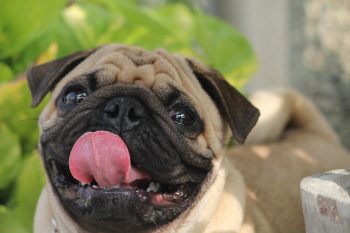Pugs, with their distinctive wrinkled faces and expressive eyes, have been charming dog lovers for centuries. They are adored for their playful personalities, compact size, and affectionate nature, making them popular companions around the world. However, as with any breed, owning a Pug comes with its own set of challenges. These challenges should not be viewed as deterrents but as important aspects to consider for potential and current Pug owners. Understanding these traits is key to providing the best care and environment for these dogs. This article aims to explore some of the downsides of owning a Pug, offering a realistic view of what it means to live with this unique breed, while still appreciating the joy and companionship they bring.
7 Reasons Why Pugs Might Not Be Right For You
Brachycephalic Breathing Issues: Due to their short snouts, Pugs often suffer from brachycephalic syndrome, which can cause breathing difficulties, snoring, and problems with regulating body temperature, especially in hot or humid conditions.
Prone to Obesity: Pugs tend to gain weight easily, making them prone to obesity. This requires owners to carefully manage their diet and ensure they get adequate exercise to maintain a healthy weight.
Grooming and Skin Care: Their wrinkles need regular cleaning to prevent skin infections. Pugs also shed quite a bit, despite their short coat, requiring regular grooming to manage the shedding.
Susceptibility to Eye Problems: Their prominent eyes are susceptible to injuries and disorders like ulcers and dry eyes. Owners need to be vigilant about their Pug’s eye health and ensure they receive prompt veterinary care when needed.
Limited Endurance: Pugs are not suited for vigorous exercise or extreme outdoor activities. Their physical structure limits their endurance, and they can quickly become overheated or exhausted.
Training Challenges: While intelligent, Pugs can sometimes be stubborn, making training a test of patience. Consistent, positive reinforcement techniques are recommended for training this breed.
Need for Companionship: Pugs are companion dogs and thrive on human interaction. They can suffer from separation anxiety if left alone for long periods, making them best suited for households where they can receive ample attention.
Owning a Pug comes with specific challenges, these traits are part of the charm that makes them such lovable companions. Their affectionate nature, playful demeanor, and unique appearance have endeared them to many. With proper care, attention, and understanding, Pugs can bring immense joy and companionship to their owners, making the effort well worth it.
On The Other Hand…
5 Positive Qualities About Pugs
Affectionate and Loving: Pugs are renowned for their affectionate nature. They form strong bonds with their owners and love to cuddle, making them excellent companions for those who enjoy close, affectionate relationships with their pets.
Great with Children and Other Pets: Pugs are generally good-natured with both children and other animals. Their gentle and playful demeanor makes them a suitable pet for families with kids and can coexist peacefully with other pets in the household.
Adaptable to Various Living Environments: These dogs are highly adaptable and can thrive in various living situations. Whether in a small apartment or a larger home, Pugs adjust well as long as they have the company and attention of their owners.
Low Exercise Requirements: Pugs do not require extensive physical activity, making them ideal for owners who prefer a more relaxed lifestyle. Their exercise needs can be met with short walks and indoor play, which suits less active owners well.
Entertaining and Comical Personality: Pugs often have a comical and entertaining personality. They are known to bring laughter and joy to their families with their playful antics and expressive faces, making them a source of constant amusement and companionship.
Pugs, with their affectionate nature, friendliness towards children and pets, adaptability, low exercise requirements, and entertaining personality, make wonderful pets for a variety of owners. These positive traits, along with the right care and attention, make them a beloved breed among dog enthusiasts.
The post Are Pugs The Worst Dog? – Food for Thought appeared first on iHeartDogs.com.

